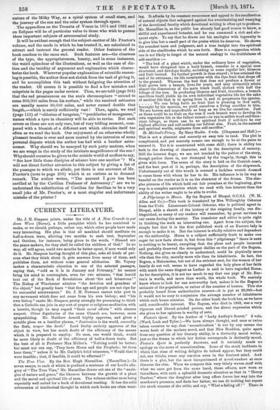CURRENT LITERATURE.
Mr. J. H. Simpson prints. under the title of A New Crusade to put down lVars (Burns), a little pamphlet which he has contrived to make, or we should, perhaps, rather say, which other people have made very interesting, His plan is that all mankind should meditate on half-a-dozen texts, allotting two months to each text, September and October, for instance, being given to the words, " Blessed are the peace-makers, for they shall be called the children of God." In no way, all will agree, could two months be better spent, if men would only do it. Mr. Simpson having thought of this plan, asks all kinds of per- sons what they think about it, gets answers from many of them, and publishes them, not without some general edification. Mr. Voysey makes a characteristic objection to one of the selected passages, saying that, "cold as it is in January and February," ho cannot bring his mind to contemplate, even for two minutes, "that horrid text out of the Book of Revelations about fire and brimstone.' " The Bishop of Winchester admires " the devotion and grandeur of the object," but greatly fears "that the age and people are not ripe for its successful achievement." Dr. J. H. Newman cannot take part in any movement which does not come from his own bishop ; and "his own bishop" snubs Mr. Simpson pretty strongly for presuming to think that a Catholic can join in any sort of prayer or religious meditation with a heretic, though he may regard "their moral efforts" with sincere respect. Other dignitaries of the same Church are, however, more sympathizing. Mr. Matthew Arnold highly approves, and gives a notable gloss on a familiar phrase, " Inattention is the world, sensuality the flesh, temper the devil." Lord Derby entirely approves of the object in view, but has much doubt of the efficiency of the means which, it is prepared to employ. No man, one would think, would be more likely to doubt of the efficiency of half-a-dozen texts. But the best of all is Professor Max Miiller's. "Nothing could be better; but must not one say, 'They have Moses and the Prophets; let them hear them,'" unless it be Mr. Carlyle's brief utterance, " Would that it were feasible ; that, if feasible, it could be effectual !"


































 Previous page
Previous page